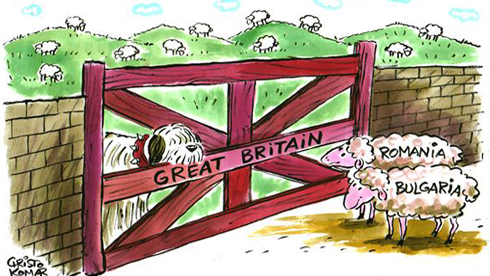
Free movement: Has policy making and the media lead to racialization in the UK?
image: Christo Komarnitski on VoxEurope
By Violet Zand Goodarzi
Migration is a complex and multi dimensional problem. The net migration to the UK has rapidly increased since 2004, when the EU opened its doors to the 8 new member states. Despite what the media may depict, this influx of immigrants helped our economy, with an increase in labour force leading to a gain in the potential output capacity of our economy. This considered, it seems strange that the growing immigration into the UK was met with so much negative emotion. A huge part of the Brexit leave campaign was based on tightening immigration policies. It is clear that policy making has led to racialization with the media often ascribing ethnic or racial identities to a group who would not identify itself as such. I will be addressing the idea that the media and policy making in the UK has led to practices of racialization which contribute to the marginalisation of migrants in our country.
Why do people migrate? It is clear that migration into the UK isn’t a new phenomenon. People have been migrating into our country for hundreds of years, it is a tale as old as time. Social networks are likely to influence the decisions of migrants as well as the role of family relations, with many migrants moving in the hope to gain more financial stability. After the Second World War, Britain saw the arrival of people from former colonies to aid the post-war economic recovery. However, since 2004 Britain has experienced a rapid increase of migration, when it granted 8 countries newly joining the EU free access to the labour market due to severe labour shortages the country was facing. This led to many European migrants coming into the UK, since 2007 over 80,000 Romanians and 55,000 Bulgarians have entered the country. (Migration Observatory analysis of LFS data, quarterly averages, all ages.)
Racialization does not require discrimination on grounds of biological differences, as most of the migrants who came after 2004 were white, the discrimination they faced was based on differences in cultural practices. Race is not a biological construct but a social one that can have catastrophic effects. Race is not a trait of migrants but rather it comes part and parcel with the marginalisation and exclusion they experience. The media had a huge role in legitimising racialization by reinforcing institutionalized practices of exclusion based on cultural differences. The media has so much control on the public’s opinion. It is a form of soft power which is used to control the hearts and minds of the people. The tabloids focused on provoking fear in the public, by hammering home the idea that migrants were taking our jobs, specifically targeting the white working class readers.
The Brexit leave campaign became heavily based around anti- immigration policies and seemed to normalise racism and xenophobia. The new and tightened immigration policies that dominated the debate depicted the sad truth that institutionalised racism was embedded into our society. The new policies now discussed were dramatically reproducing the idea of ‘us and them’, which were heavily based on the exaggeration of differences in cultural practices. After months of anti-immigration campaigning, the Brexit vote led to a 41% surge in hate crimes in the following months. (Hate on the Street – Panorama)
The marginalisation that migrants face is a result of racialization. Many people would argue that they are not racist as they are not discriminating based on the colour of skin, however, this does not shy away from the fact that these migrants are being marginalised from society based on ethnicity. It is through categories ascribed to a group that visual differences become apprehended. For example, after the Brexit vote, many Polish food shops where vandalised.
I feel that policy-makers have used immigration control as a way of simultaneously reproducing and legitimising ‘race’ in ways that contribute to the structuring of uneven social relations in the UK. The media have had a strong influence on society as we are malleable. In a time where Britain is in chaos with uncertainty for our future as a nation being at the forefront of many citizens worries, everyone is scared. The tabloids and policy-makers have taken this chaos and used it to their advantage. When society lacks certainty, we are much more easily manipulated.
Ultimately, Britain is a country of immigrants and this story plays out throughout history. The Romans were here for 800 years, then the Vikings and Scandinavians came. Jewish refugees in WW2 followed by the post-war colonial influx of Caribbean migrants as well as Indian and Bangladeshi, and more recently Eastern Europeans. 50% of British monarchs didn’t speak English as their 1st Language. Each time we see the same cycle of local paranoia, this story has played out countless times and is part of the British migration story. For this reason I believe that it is imperative to recognise race in order to prevent it being used as a political tool. By acknowledging what it is about race that creates so much divide we are able to begin to envision a more inclusive future for Britain.

0 Comments